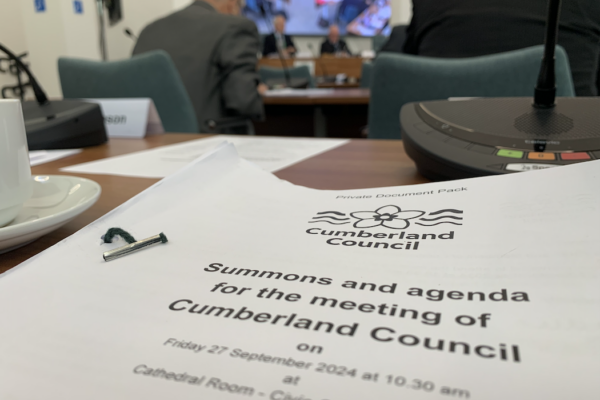
Answers to Questions
At the last full Council meeting, myself and other members of the Liberal Democrat Group asked the following questions of notice to the Council Leader and Executive. Here are the questions and full responses:
Councillor Pickstone submitted the following question to the Deputy Leader and the Leader:
‘Could the Deputy Leader and Leader inform members if there is currently a shortfall in the provision of dementia nursing care in Cumberland, and what is the Council’s plans to address this going forwards?
The demand for dementia nursing beds in Cumberland has increased significantly over the last 12-18 months which has put additional pressure on the health and social care system. This increased demand has meant that there can be delays in identifying suitable provision for residents in Cumberland, but overall, the care market has been able to respond well in dealing with these challenges.
In response to these challenges the Council has been able to use the Market Sustainability Improvement Fund (MSIF) and the Councils own funding to provide financial uplifts to all Residential & Nursing Care Homes. These uplifts had a particular focus on dementia services to help support care staff and to stimulate the care market. As a result of these uplifts Cumberland Council now offers one of the highest rates for dementia services across the North East footprint.
In order to address the challenges around increased demand for Dementia Nursing beds, the Council is supporting a number of initiatives to improve the capacity in the market. This includes:
- Regular engagement with care providers, ICB colleagues and key stakeholders to support partnership working and maximise the use of available beds within the care market.
- Developing Intermediate Care Services which provide intensive rehabilitation and reablement to maximise peoples’ independence and support people to return home. We know that a high proportion of people receiving some form of reablement rather than a long-term care home placement can stay at home for longer
- Expanding community and home care services to reduce the demand for nursing beds, allowing residents to receive care in their own homes.
- Working with care providers to implement the Adult Social Care Workforce Strategy to enhance the recruitment and retention of staff, whilst improving the quality and efficiency of care provided.
- Developing a Market Position Statement (MPS) for Adult Social Care & Housing in Cumberland to better understand current and future service demands and capacity within the market.
Councillor Pickstone submitted the following question to the Portfolio Holder for Cumberland Policy and Regulatory Services:
‘Could the Portfolio Holder for Cumberland Policy and Regulatory Services inform members what, if any, plans there are to up update planning policies to regulate the level of community benefit from the growing number of green energy developments that are, and will be, coming forwards?’
The national and local planning policy position is certainly supportive of further green energy developments in the quest to reduce global carbon emissions. This is reflected in the Local Plans which contain appropriate criteria against which development proposals are assessed. Adverse impacts that are identified in the assessment of development can be mitigated by planning conditions or through s106 planning agreements which could see the direct delivery of resources to deliver specific infrastructure or enhancements.
However, the use of “Community Benefits” packages from the development industry falls outside the planning regime and is not material to the planning assessment. Consequently, the Local Plans or associated policies are not a legitimate mechanism to determine the relevance, type or level of “Community Benefit”. There is an established principle that the council as representative of the community interest can accommodate the potential for indirect community benefit to be afforded locally, although this is fully at the discretion of the developer or scheme promoter.
To ensure opportunities for our communities surrounding “Community Benefits” can be maximised, the Council is planning to further explore working principles around developer engagement and establishing legacy benefits from major energy infrastructure proposals.
Councillor Dobson submitted the following question to the Portfolio Holder for Sustainable, Resilient and Connected Places:
‘I am pleased to note that repair work to the Cairn Bridge Embankment has resumed and this key route between Heads Nook and Faugh will soon reopen. A road closure scheduled for seven weeks will have taken over a year and seven weeks. Will the Portfolio Holder for Sustainable, Resilient and Connected Places confirm that important lessons will be learnt from this unfortunate experience?’
The 7 week scheme that was started last year was interrupted by the actions of the landowner who reneged on an agreement for the work to take place. The local team worked tirelessly to seek agreement with the landowner but ultimately had to rely on the courts to gain access.
The council has obligations to all residents, including the inconvenience to the wider public as well as the landowner themselves.
Taking legal action is always seen as the last step, and every situation needs to be assessed individually. Striking the right balance between the desire to seek an agreement with the third party against the level of disruption caused to the public and the cost to the council, is never an easy judgement.
Councillor Dobson submitted the following question to the Leader:
‘It has been was reported in the press that “A new group to develop and deliver plans for an ambitious expansion of the Port of Workington has met to start work” and that “Cllr Fryer updated the group on plans to change the governance structure and management of the port”. Will the Leader share with the Council today what the plans are for changing the governance structure and management of the port?’
A meeting of local business, MPs, senior Council officers and elected members, took place on 2nd August at RWE’s office on the Port site. Discussions were held regarding the Cumberland economy, business development opportunities and the strategic location and offer of the Port as a multi-modal facility. Further discussions are to be held as the Council continues to develop a strategic plan for the Port and associated development, whilst engaging with local businesses.
Port governance is being reviewed to recognise the strategic importance the Port has for this Council and to ensure we can maximise the opportunities it presents. This includes the terms of reference, objectives, streamlining processes and enhancing decision-making. With the objective of being able to better leverage funding opportunities. Any proposed change will be subject to a further report to Full Council.
In terms of day-to-day activities there are no immediate plans to change the operational management of the Port and we are currently in the process of recruiting a permanent Port Manager.
Councillor Wills submitted the following question to the Deputy Leader, Statutory Lead for Children’s Services:
‘Could the Deputy Leader, Statutory Lead for Children’s Services, inform members what specific goals or targets the council has set for the development, availability, and improvement of social housing within the area? Could you also provide details on the timeline for meeting these targets, the number of housing units expected, and any key initiatives or programs designed to achieve these objectives?’
I’ve broken it down into the different questions:
- what specific goals or targets the council has set for the development, availability of housing in our area?
The Council is not a stock holding authority or a developer of new social or affordable housing and therefore it doesn’t have specific targets set for developments. Our role is to work with Housing Developers, Housing Associations, Community Land Trust (CLTs), Homes England and other key strategic partners to inform them of the need and demand for housing, its’ tenure, size, specialist requirements and to negotiate how social/affordable homes can be brought to the market.
The Council’s Housing Team, will make recommendations and comments for social affordable housing delivery through the planning process. We will comment on planning application, however, it doesn’t always mean that social/affordable housing will be approved /supported. There may be a number of reasons for this but predominately, if there is no social/affordable housing being provided or delivered, it will be down to viability of the site, at which the affordable housing is dropped from the development.
The delivery of social/affordable housing is dependent on the pace at which developers and registered housing providers and CLTs are able to bring sites forward. The timescales will vary, and the Council will find out when a development has commenced through the planning teams.
- Improvement of social housing within the area?
As mentioned, the Council doesn’t have its own housing stock. The Housing Associations are regulated, and will have in place a programme of works in which to bring the homes up to a decent standard.
On 29 February 2024, the Regulator of Social Housing (RSH) has set out its new standards for social housing landlords, designed to protect tenants and improve the service they receive. RSH has also confirmed how it will regulate landlords against these standards.
The changes, which are a result of the landmark Social Housing Regulation Act, come into effect from 1 April 2024. They will apply to all social landlords, including councils and housing associations.
The inspection programme will start from April and run in four-year cycles.
Further information can be found using the link below:
https://www.gov.uk/government/news/rsh-sets-new-standards-to-drive-improvements-in-social-housing
- key initiatives or programs designed to achieve these objectives?
As the strategic housing authority our role is to keep under review regularly the need and demand for housing for the population of residents living in the Cumberland.
The Council has recently embarked on a number of housing studies to understand what this looks like in both general needs housing (localism Act) and supported housing following the introduction of the Supported Housing Act 2023. These studies will strengthen our negotiating position for more social/affordable housing for both general needs and supported housing and will inform us on how many new properties we need, the tenure type, size and where they are needed most over the next 15years.
The Council has commissioned external consultants to help us with this work, which is due for completion at the end of November 2024. This will then enable the Council to understand the future priorities over the next 15years with intermittent reviews, and will help shape Cumberland Councils new housing strategy, and supported housing strategy which we will commence soon.
Councillor Wills submitted the following question to the Leader:
‘In June 2023, the Council chose not to move forward with a Community Governance Review for urban Carlisle, deeming it premature due to the recent establishment of Community Panels and Community Engagement Panels for community representation. The meeting minutes indicated that a further report would be presented to the Council for consideration in 2024. As no such report has been provided yet, could the Leader inform members when the Community Governance Review for Carlisle is expected to begin?’
There is currently no intention to begin a Community Governance Review for Carlisle. This suggestion was explicitly rejected by Council in June 2023, as Councillor Wills notes. That rejection was based on three key factors. First, the very recent local government reorganisation, which needed time to settle down; while obviously a lot has stabilised in the last 18 months, there is still a lot to resolve, with a devolution deal hopefully the next thing on the horizon. Second, the fact that there is a Boundary Committee review to be carried out; that remains the case, as discussed elsewhere on this agenda, and it would be premature to act in advance of that. And finally, the need for time to establish and run the Community Panels, which would offer a more local focus for the Council’s activities. Executive earlier this month received a report on the first year of these Panels’ activities and I think Members will agree that they are developing very well and have a lot of potential to expand their roles. The June 2023 report did say that a further report would be brought to Council in 2024 and that will come to the November meeting.





